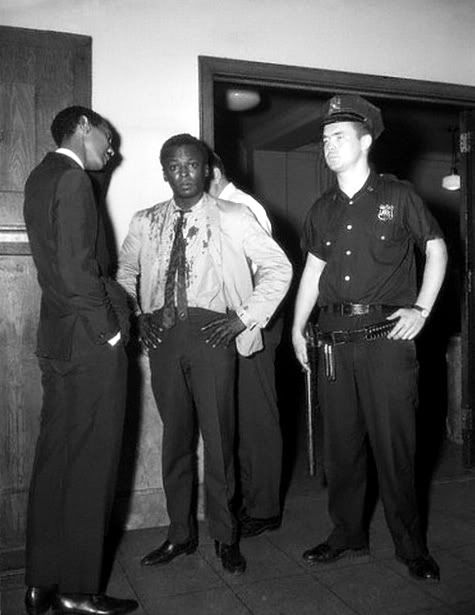 If Charlie Parker Was a Gunslinger
If Charlie Parker Was a Gunslinger ran this photo of Miles Davis a few days ago with the accompanying newspaper caption:
Musician Arrested.
New York -- Miles Davis, 32, of 881 10th Avenue, a trumpeter now appearing in Birdland, 52nd Street and Broadway, was arrested after fighting with patrolman Gerald Kilduff, who had ordered him to move from crowded sidewalk. In the scuffle, Davis was hit on the head with a blackjack for which a St. Clare's ambulance had to be called. (1959)
Of course, in his autobiography, Miles remembered it differently:
I had just finished doing an Armed Forces Day broadcast, you know, Voice of America and all that bullshit. I had just walked this pretty white girl named Judy out to get a cab. She got in the cab, and I'm standing there in front of Birdland wringing wet because it's a hot, steaming, muggy night in August. This white policeman comes up to me and tells me to move on. At the time I was doing a lot of boxing, so I thought to myself, I ought to hit this motherfucker because I knew what he was doing. But instead I said, "Move on, for what? I'm working downstairs. That's my name up there, Miles Davis," and I pointed to my name on the marquee all up in lights.
He said, "I don't care where you work, I said move on! If you don't move on I'm going to arrest you."
I just looked at his face real straight and hard, and I didn't move. Then he said, "You're under arrest!" He reached for his handcuffs, but he was stepping back. Now, boxers had told me that if a guy's going to hit you, if you walk toward him you can see what's happening. I saw by the way he was handling himself that the policeman was an ex-fighter. So I kind of leaned in closer because I wasn't going to give him no distance so he could hit me on the head He stumbled, and all his stuff fell on the sidewalk, and I thought to myself, Oh, shit, they're going to think that I fucked with him or something. I'm waiting for him to put the handcuffs, on, because all his stuff is on the ground and shit. Then I move closer so he won't be able to fuck me up. A crowd had gathered all of a sudden from out of nowhere, and this white detective runs in and BAM! hits me on the head. I never saw him coming. Blood was running down the khaki suit I had on. Then I remember Dorothy Kilgallen coming outside with this horrible look on her face--I had known Dorothy for years and I used to date her good friend Jean Bock--and saying, "Miles, what happened?" I couldn't say nothing. Illinois Jacquet was there, too.
It was almost a race riot, so the police got scared and hurried up and got my ass out of there and took me to the 54th Precinct, where they took pictures of me bleeding and shit. So, I'm sitting there, madder than a motherfucker, right? And they're saying to me in the station, "So you're the wiseguy, huh?" Then they'd bump up against me, you know, try to get me mad so they could probably knock me upside my head again. I'm just sitting there, taking it all in, watching every move they make.
Miles adds, "I would have expected this kind of bullshit about resisting arrest and all [for which he was charged that night] back in East St. Louis (before the city went all black), but not here in New York City, which is supposed to be the slickest, hippest city in the world." For all America's ills, at least some things have changed for the better. On with this month's links.
- Fresh off the folding of Jazz Times, Nate Chinen's regular column at the magazine, The Gig, has moved over to his new blog of the same name. Here he discusses the jazz influences of indie rock stars Grizzly Bear.
- Michael Katzif at A Blog Supreme interviews Icons Among Us director Michael Rivoira.
- Black Classical has released a tribute to Blue Note Records: a huge mix featuring Blue Note tracks from Andrew Hill, Bobby Hutcherson, Wayne Shorter, Jackie McLean, and more. Check it out, it is worth a listen.
- Don Heckman interviews Jimmy Cobb on the anniversary of Kind of Blue.
- At Rifftides, Doug Ramsey reiterates what everyone should know: Late-period Ellington is among some of the best music ever recorded.
- Stephan Mejias takes a look at the latest reissue of Spiritual Unity.
- Jazz.com has a wide-ranging interview with Jack DeJohnette.
- Here is a snippet of Charles Mingus' Remember Rockefeller at Aticca (context):
 If Charlie Parker Was a Gunslinger ran this photo of Miles Davis a few days ago with the accompanying newspaper caption:
If Charlie Parker Was a Gunslinger ran this photo of Miles Davis a few days ago with the accompanying newspaper caption: 


No comments:
Post a Comment